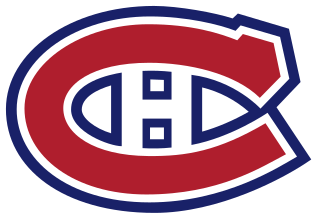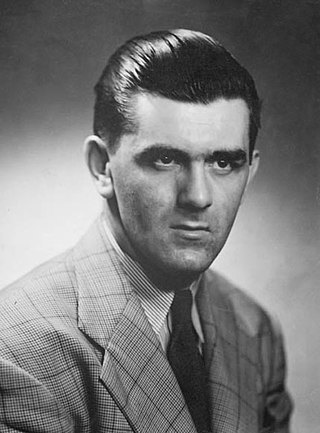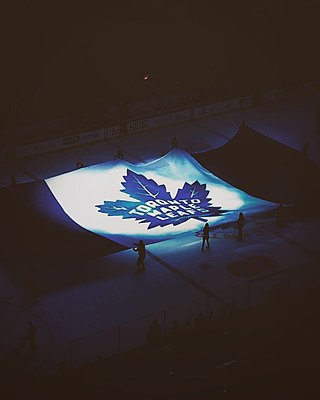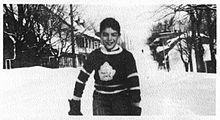
The Montreal Canadiens, officially le Club de hockey Canadien and colloquially known as the Habs, are a professional ice hockey team based in Montreal. They compete in the National Hockey League (NHL) as a member of the Atlantic Division of the Eastern Conference. Since 1996, the Canadiens have played their home games at Bell Centre, originally known as Molson Centre. The team previously played at the Montreal Forum, which housed the team for seven decades and all but their first two Stanley Cup championships.

The Toronto Maple Leafs are a professional ice hockey team based in Toronto. They compete in the National Hockey League (NHL) as a member of the Atlantic Division in the Eastern Conference. The club is owned by Maple Leaf Sports & Entertainment, a company that owns several professional sports teams in the city. The Maple Leafs' broadcasting rights are split between BCE Inc. and Rogers Communications. For their first 14 seasons, the club played their home games at the Mutual Street Arena, before moving to Maple Leaf Gardens in 1931. The Maple Leafs moved to their present home, Scotiabank Arena, in February 1999.

Joseph Henri Maurice "Rocket" Richard was a Canadian professional ice hockey player who played 18 seasons in the National Hockey League (NHL) for the Montreal Canadiens. He was the first player in NHL history to score 50 goals in one season, accomplishing the feat in 50 games in 1944–45, and the first to reach 500 career goals.

Robert Cecil Cole is a Canadian former sports television announcer who has worked for CBC and Sportsnet and former competitive curler. He is known primarily for his work on Hockey Night in Canada.

A hockey sweater is a piece of clothing worn by ice hockey, ringette, broomball, and spongee players to cover the upper part of their bodies. These jerseys are occasionally worn by North American bandy players as well as some rinkball players in Finland. This article deals chiefly with jerseys worn by ice hockey players.

William "Bashin' Bill" Barilko was a Canadian ice hockey player who played his entire National Hockey League career for the Toronto Maple Leafs. Over five seasons, Barilko won the Stanley Cup four times in 1947, 1948, 1949, and 1951. Barilko died in August 1951 in a floatplane crash during a fishing trip to Quebec. Barilko's #5 was retired by the Leafs. He was the subject of the 1993 single "Fifty Mission Cap" by The Tragically Hip.

The Hockey Sweater is a short story by Canadian author Roch Carrier and translated to English by Sheila Fischman. It was originally published in 1979 under the title "Une abominable feuille d'érable sur la glace". It was adapted into an animated short called The Sweater by the National Film Board of Canada (NFB) in 1980 and illustrated by Sheldon Cohen.
The 1946–47 NHL season was the 30th season of the National Hockey League. The Toronto Maple Leafs defeated the Montreal Canadiens in the 1947 Stanley Cup Finals to win their sixth Stanley Cup championship.
The 1951–52 NHL season was the 35th season of the National Hockey League. The Detroit Red Wings won the Stanley Cup by sweeping the Montreal Canadiens four games to none.
The 1933–34 NHL season was the 17th season of the National Hockey League (NHL). Nine teams each played 48 games. The Chicago Black Hawks were the Stanley Cup winners as they beat the Detroit Red Wings three games to one.

The history of the Toronto Maple Leafs, a professional ice hockey team in the National Hockey League (NHL), begins with the establishment of the NHL itself. Both the Toronto Maple Leafs and the NHL arose from disputes between Eddie Livingstone, owner of the National Hockey Association's Toronto Blueshirts, and the other team owners of the Association. In November 1917, these other team owners founded the NHL, and granted Toronto a temporary franchise in their new league. Playing at Arena Gardens, this temporary team, the Toronto Arenas, won the 1918 Stanley Cup Finals following the inaugural 1917–18 NHL season. The NHL made the franchise permanent in October 1918.
"Fifty Mission Cap" is a song by Canadian rock group The Tragically Hip. It was released in January 1993 as the second single from the band's third full-length album, Fully Completely. It was first played in front of a live concert audience at Maple Leaf Gardens in Toronto on December 16, 1991.
The 1951 Stanley Cup Finals was contested by the Toronto Maple Leafs and the Montreal Canadiens. The Maple Leafs won the series 4–1, with all five games going into overtime. It was the Toronto franchise's ninth Stanley Cup win and the last in a series of six wins starting in 1942. It was the first appearance in a string of ten consecutive appearances by the Canadiens.
The 1947 Stanley Cup Finals was a best-of-seven series between the Toronto Maple Leafs and the defending champion Montreal Canadiens. The Maple Leafs won the series four games to two. This was the first all-Canadian Finals since 1935, when the since-folded Montreal Maroons defeated the Maple Leafs.
The 1950–51 Toronto Maple Leafs season involved winning the Stanley Cup. The Stanley Cup was famous for Bill Barilko scoring the winning goal.
Ice hockey, partially because of its popularity as a major professional sport, has been a source of inspiration for numerous films, television episodes and songs in North American popular culture.

The Original Six era of the National Hockey League (NHL) began in 1942 with the demise of the Brooklyn Americans, reducing the league to six teams: Boston Bruins, Chicago Black Hawks, Detroit Red Wings, Montreal Canadiens, New York Rangers, and Toronto Maple Leafs. This structure remained stable for a quarter century; the era ended in 1967 when the NHL doubled in size adding six expansion teams.

The Canadiens–Maple Leafs rivalry is an ice hockey rivalry between the Montreal Canadiens and Toronto Maple Leafs, two professional ice hockey clubs in the National Hockey League (NHL). The Canadiens and Maple Leafs are the league's oldest teams, with the former established in 1909 and the latter in 1917. Both clubs compete in the Atlantic Division of the NHL's Eastern Conference.

Face-Off is a 1971 Canadian feature film produced by John F. Bassett starring Art Hindle, Trudy Young and John Vernon. The story line concerns a rookie Toronto Maple Leafs ice hockey player and his romance with a musician. Several National Hockey League players also appeared in the film.












